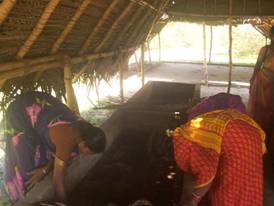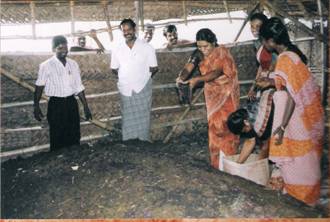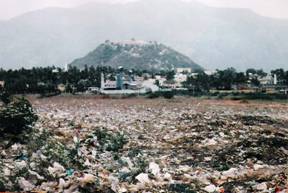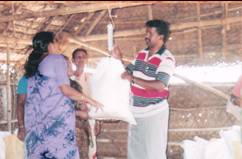|
Communities Lead the Way Singarathope and Peruyappa Nagar have undertaken efforts to improve the area and also generate additional income, here is how T  he
sight of a waste overflowing from dustbins and the stench rising from it
are a familiar feature of urban India. In developing countries such as
India there is a massive exodus of rural population into urban centres.
Estimates show that India will have more than 40% of the entire
populace, i.e. over 400 million people clustered in cities over the next
thirty years (UN, 1995). This increase in population and rapid
urbanization has been largely responsible for the huge increase in solid
waste. As the cities are growing in size, so are the garbage disposal
problems. Proper waste management will be a difficult issue to handle in
the near future, if a new paradigm for approaching it is not created. he
sight of a waste overflowing from dustbins and the stench rising from it
are a familiar feature of urban India. In developing countries such as
India there is a massive exodus of rural population into urban centres.
Estimates show that India will have more than 40% of the entire
populace, i.e. over 400 million people clustered in cities over the next
thirty years (UN, 1995). This increase in population and rapid
urbanization has been largely responsible for the huge increase in solid
waste. As the cities are growing in size, so are the garbage disposal
problems. Proper waste management will be a difficult issue to handle in
the near future, if a new paradigm for approaching it is not created.
Towns and cities need to develop a variety of responses which are best suited for local conditions rather than borrowing non-contextual solutions from elsewhere. There have been a variety of policy responses to the problem of urban solid waste in India, especially over the past few years, yet sustainable solutions either of organic or inorganic waste remain an unattended area. Composting: The Ecological and Economically Sustainable Solution
Community initiatives on solid waste management in south India The CLEAN-India programme has been instrumental in initiating a noticeable change in the management on solid waste at the community level in small towns. The CLEAN-India network has been able to create a platform for people to share their expertise on waste management. Today, many communities have been able to set up decentralized waste management systems where the organic waste is segregated from the remaining waste and converted to manure. Women’s self help groups maintain these units and the manure is then sold in order to generate income. Two such initiatives are described below. SINGARATHOPE, CUDDALORE, TAMIL NADU CLEAN-India Partner: Foundation for Ecological Research Advocacy and Learning (FERAL), Pondicherry Singarathope is a village
situated in Cuddalore, an old town FERAL has been working in
association with schools in Cuddalore through the CLEAN-India programme.
In order to improve waste management and cleanliness in Singarathope
village, FERAL initiated a decentralised composting system in April 2006
under the Community Environment Action for Sustainable (CEASD) programme
funded by the Foundation Ensemble (FE). The members of the SHGs, along
with the CLEAN-India students from St. David’s School, conducted various
awareness programmes for the local community on issues of solid waste
management such as waste segregation, street cleaning and environmental
health wit The vermi-compost is harvested, sieved and dried, after which it is ready for use. After the first harvest, the vermi-compost was distributed among the members to use in their gardens and the remaining amount was sold. The group also sells earthworms at Rs 350/- per kg and plans to prepare vermi-wash, a valuable fertilizer for plants. SSP and the Foundation Ensemble programme sponsored infrastructure costs. The women in the construction of the composting unit contributed the labour. Maintenance of the compost unit is done on a voluntary basis by the women (2 women spend approximately 2 hours a day). The Cuddalore Municipality Commissioner visited the community composting unit and was genuinely appreciative of the women’s efforts. The commissioner also agreed to allocate funds for the project. The ASHA members of Singarathope are highly motivated and deeply interested in making a difference to the environment of their village. The have encouraged individual households to start vermi-composting in order to manage the waste. Peruyappa Nagar, Palani, Tamil Nadu CLEAN-India Partner: Palni Hills Conservation Council (PHCC), Kodaikanal
Palani is surrounded by five Town Panchayats, whose population is dependent on agriculture and allied work. Most of the population in Palani depends on tourism. For the last four years, PHCC has been working along with schools in Palani through the CLEAN-India programme. This was further extended to the entire community through the families of the CLEAN-India student members. The students played a vital role in motivating the community. They were motivated to learn more about eco sanitation and convinced their families to separate waste in two different dustbins, one for biodegradable waste and the other for non-biodegradable waste.
The area for setting up the composting unit, measuring 2000 sq ft, was obtained from the Municipal Corporation. As the municipality elections were due when the project was initiated, no official wanted to take this added responsibility. After the elections it took a further two months for the new office bearers to be appointed. Thus, three months were spent trying to obtain permission for using a small piece of land for the solid waste management project. This was finally initiated in January 2007. The members of the community played a key role in getting the officials to permit the use of the land for SWM. A group of twenty women were selected from about 140 households for training on composting methods through classroom teaching for 15 days. Weekly classes were conducted to help them realize the health benefits of composting. The members visited a organic farm in Udumalaipet for a field visit. The owner Mr Selvaraj has devised a novel method of composting using earthworms and EM in raised beds of coconut husk and cow dung. This method was selected for composting at Peruyappa Nagar.
The women at Peruyappa Nagar have benefited by selling the compost. This practice has also led to the improvement of the surrounding environment as waste is been segregated and used effectively, and the revenue generated is being used for the maintenance of the unit. The future plan of PHCC is to make Palani a garbage-free town through: n Implementing of decentralized solid waste management system in all the wards in Palani town;n Banning the use of plastic carry bags;n Organising rallies, campaigns and workshops; andn Putting up display boards in different parts of the town. These two examples show us how small initiatives taken up at the village level in association with local community members can benefit the entire populace and the surrounding environment, improving sanitation and health. Children can be strong motivating agents of change and their efforts can initiate the chain reaction needed for sustainable impacts. q
|
 Municipalities
are now trying various treatment and disposal methods in an effort to
resolve the problem of eco-friendly garbage disposal. Till now, the
problem of waste has been seen as one of cleaning and getting rid of
rubbish. But a closer look at the current and future scenario reveals
that waste needs to be treated holistically, recognising its natural
resource potential as well as health impacts. Waste is wealth, which has
tremendous potential not only for generating livelihoods for the urban
poor but can also enrich the soil in the form of valuable compost.
Municipalities
are now trying various treatment and disposal methods in an effort to
resolve the problem of eco-friendly garbage disposal. Till now, the
problem of waste has been seen as one of cleaning and getting rid of
rubbish. But a closer look at the current and future scenario reveals
that waste needs to be treated holistically, recognising its natural
resource potential as well as health impacts. Waste is wealth, which has
tremendous potential not only for generating livelihoods for the urban
poor but can also enrich the soil in the form of valuable compost.
 Composting
of city waste is a legal requirement provided under the Municipal Solid
Waste Management (MSW) Rules 2000, applicable for all municipal bodies
in the country. As per the MSW rules, biodegradable wastes should be
processed by composting, vermi-composting, anaerobic digestion or any
other appropriate biological processing for the stabilisation of wastes.
Composting
of city waste is a legal requirement provided under the Municipal Solid
Waste Management (MSW) Rules 2000, applicable for all municipal bodies
in the country. As per the MSW rules, biodegradable wastes should be
processed by composting, vermi-composting, anaerobic digestion or any
other appropriate biological processing for the stabilisation of wastes.
 in coastal Tamil Nadu. A community of 900 households, Cuddalore is
mainly dependent on fisheries for its livelihood. This area was affected
by the tsunami in 2004. Swayam Shiksha Prayog (SSP), an NGO working in
the rehabilitation programme for tsunami-affected communities, formed a
women’s group called ASHA – Arogya Sakhi for Health Awareness and
Action, which consists of 9 Self Help Groups (SHGs) with around 20
members each. These SHG groups have been engaged in social developmental
activities such as water and sanitation, health and environment and
village cleanup.
in coastal Tamil Nadu. A community of 900 households, Cuddalore is
mainly dependent on fisheries for its livelihood. This area was affected
by the tsunami in 2004. Swayam Shiksha Prayog (SSP), an NGO working in
the rehabilitation programme for tsunami-affected communities, formed a
women’s group called ASHA – Arogya Sakhi for Health Awareness and
Action, which consists of 9 Self Help Groups (SHGs) with around 20
members each. These SHG groups have been engaged in social developmental
activities such as water and sanitation, health and environment and
village cleanup.  h
the intention to motivate them towards better sanitation
h
the intention to motivate them towards better sanitation in the villages. After the awareness programmes, the 9 SHGs got together
to start a composting unit. Of the 900 households in the village, about
400 households are actively involved in the waste segregation programme.
Households segregate their organic biodegradable waste from the
non-degradable garbage at source. The members of the groups have divided
the area amongst themselves for door-to-door collection of organic
waste. The collected waste is brought to the composting yard. The waste
is first composted aerobically using cow dung and effective
microorganisms (EM) for around 25 days. The waste is then transferred to
a vermi-composting pit, where it is converted into vermi-compost, a rich
organic manure in around fifteen to twenty days.
in the villages. After the awareness programmes, the 9 SHGs got together
to start a composting unit. Of the 900 households in the village, about
400 households are actively involved in the waste segregation programme.
Households segregate their organic biodegradable waste from the
non-degradable garbage at source. The members of the groups have divided
the area amongst themselves for door-to-door collection of organic
waste. The collected waste is brought to the composting yard. The waste
is first composted aerobically using cow dung and effective
microorganisms (EM) for around 25 days. The waste is then transferred to
a vermi-composting pit, where it is converted into vermi-compost, a rich
organic manure in around fifteen to twenty days.  Palani,
the temple town and abode of Lord Murugan, situated near Kodaikanal in
Dindigul District of Tamil Nadu, is the third most visited Hindu shrine
in south India. As per the 2001 census, the town has 16,300 households
and 67,000 residents. The present population may be around 90,000 –
100,000, with more than 25,000 households. The floating population in
the town is very high; according to some estimates, pilgrims may number
more than 5 million per year. About 50,000 people come here each day to
visit the temple and market their produce from nearby villages.
Therefore, this increase in the local population and visitors has
increased the solid waste generation, leading to improper sanitation
conditions in the town.
Palani,
the temple town and abode of Lord Murugan, situated near Kodaikanal in
Dindigul District of Tamil Nadu, is the third most visited Hindu shrine
in south India. As per the 2001 census, the town has 16,300 households
and 67,000 residents. The present population may be around 90,000 –
100,000, with more than 25,000 households. The floating population in
the town is very high; according to some estimates, pilgrims may number
more than 5 million per year. About 50,000 people come here each day to
visit the temple and market their produce from nearby villages.
Therefore, this increase in the local population and visitors has
increased the solid waste generation, leading to improper sanitation
conditions in the town.  Despite
a few obstacles such as non-cooperation from municipality officials, no
site being allocated for garbage collection at wards, etc., PHCC, with
the help of CLEAN-India students and the community, was successful in
setting up a community composting unit at Peruyappa Nagar. The reason
behind selecting this site was mainly due to its proximity to the
municipal dumpsite. Each day, eight to ten truckloads of solid waste are
brought here and left in the open. The total area of the dumping yard
owned by the municipality is about 25 acres, where the waste is left to
rot. The waste emits methane and catches fire on most summer days, with
smoke smoldering all the time and polluting the air.
Despite
a few obstacles such as non-cooperation from municipality officials, no
site being allocated for garbage collection at wards, etc., PHCC, with
the help of CLEAN-India students and the community, was successful in
setting up a community composting unit at Peruyappa Nagar. The reason
behind selecting this site was mainly due to its proximity to the
municipal dumpsite. Each day, eight to ten truckloads of solid waste are
brought here and left in the open. The total area of the dumping yard
owned by the municipality is about 25 acres, where the waste is left to
rot. The waste emits methane and catches fire on most summer days, with
smoke smoldering all the time and polluting the air.  A
bed of 16 ft by 4 ft dimensions was prepared by ramming the earth so as
to make it impermeable. Over 1000 coconut husk pieces were spread over
the area. The husks were covered with cow dung obtained from street
cattle, thus cleaning the streets of cow dung. Then a layer of green and
dry vegetable matter was spread up to a height of around 4 inches. This
pile was covered with another layer of cow dung and sprinkled with water
and inoculate of appropriate quantity of EM. Each day the pile was
moistened with water and maintained by the women. The result was high
quality organic compost. The women have been able to successfully set up
the compositing unit using all organic matter from 140 households which
is segregated at source and then collected.
A
bed of 16 ft by 4 ft dimensions was prepared by ramming the earth so as
to make it impermeable. Over 1000 coconut husk pieces were spread over
the area. The husks were covered with cow dung obtained from street
cattle, thus cleaning the streets of cow dung. Then a layer of green and
dry vegetable matter was spread up to a height of around 4 inches. This
pile was covered with another layer of cow dung and sprinkled with water
and inoculate of appropriate quantity of EM. Each day the pile was
moistened with water and maintained by the women. The result was high
quality organic compost. The women have been able to successfully set up
the compositing unit using all organic matter from 140 households which
is segregated at source and then collected.